高中英语Unit4LawandorderLanguagepoints教案牛津译林版选修10
高中英语 Unit4 law and order-task精品教案 牛津译林版选修10
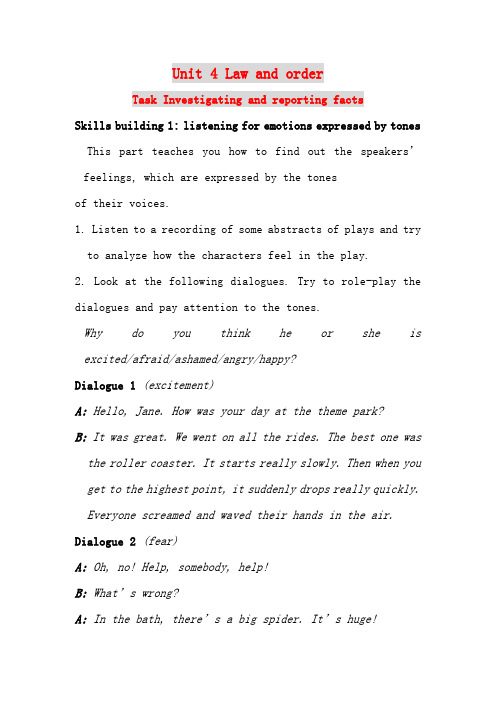
Unit 4 Law and orderTask Investigating and reporting factsSkills building 1: listening for emotions expressed by tones This part teaches you how to find out the speakers’ feelings, which are expressed by the tonesof their voices.1. Listen to a recording of some abstracts of plays and try to analyze how the characters feel in the play.2. Look at the following dialogues. Try to role-play the dialogues and pay attention to the tones.Why do you think he or she is excited/afraid/ashamed/angry/happy?Dialogue 1(excitement)A: Hello, Jane. How was your day at the theme park?B: It was great. We went on all the rides. The best one was the roller coaster. It starts really slowly. Then when you get to the highest point, it suddenly drops really quickly. Everyone screamed and waved their hands in the air. Dialogue 2 (fear)A: Oh, no! Help, somebody, help!B:What’s wrong?A:In the bath, there’s a big spider. It’s huge!B:Don’t worry. It can’t hurt you. I’ll put it outside. Dialogue 3(shame)A:Did you have a good time at your friend’s birthday party? B:I did, until it came to the birthday cake. I’m afraid I was very greedy and ran towards the cake. I tripped, and fell into the cake. It was so embarrassing.A:The important thing is you’re not hurt.Dialogue 4 (anger)A:What’s wrong? Your face is like thunder.B:I was on the bus home, and I think someone stole some money out of my pocket. It wasn’t much, but it made me so mad. A:Oh, no! At least the thief didn’t get very money though. Dialogue 5 (happiness)A: Congratulations on your exam results. You must be so pleased.B: I am. I worked really hard studying, and it all paid off. A:Let’s go out to dinner to celebrate.3. Read the instructions in this part. Make sure you know how each feeling can be expressed by different tones. Create a dialogue in which different emotions are expressed. Present your dialogues to the whole class and the rest students guess which feelings are being expressed.Step 1: finding out about a boy’s feelingsIn this part, you will first listen to a teacher interviewing a boy who has stolen some money at school, and then you will take some notes about the investigation. You will listen to the investigation again to decide the boy’s feelings from his tones.1. Read the guidelines in Part A to understand what you will do first. Go over the note sheet to get the ideas about what you should pay attention to and write them down while you are listening to the recording. Fill in the answers or predict the answers for some blanks before listening.2. Listen to the recording and finish Part A on page 58. You will have the chance to listen to the recording again and try to fill in the missing words correctly.have been anyone.Mr Li:(impatient) Now come on, you were the only person left in the room, alone with the money. Don’t playgames with me. (threatening) If you don’t tell thetruth, you could end up in trouble!Xu Jin: (afraid, voice shaking) I’m sorry, Mr Li. I didn’t mean that. Really, I was going to return the moneylater.Mr Li:(disbelieving) You were/ How did you think you were going to do that? The trip was the next day.Xu Jin:(embarrassed) I don’t know…Mr Li; (calm, fatherly) All right, now tell me why you wanted the money.Xu Jin:I wanted to go to the Internet café, and I didn’t have any money left.Mr Li:Have you been there before?Xu Jin: Yes. I go several times a week.Mr Li: What do you do there?Xu Jin:(mumbling a bit, not very convincing) I… do my homework.Mr Li:(disbelieving) Homework? Is that all?Xu Jin;Well, no. I play games.Mr Li;Games?Xu Jin:(eager) Yes. I play Internet games with people all around the world. It’s really fun, and I get to meetnew friends from other countries.Mr Li:(disbelieving) Hmm. I am not so sure that’s a good thing. Do your parents know that you’re doing this? Xu Jin:No. I go late at night. They don’t know that I go out.Mr Li: (angry) Do you realize that you’ve allowed this habit of yours to make you do some very bad things?You’ve been lying to your parents and stole moneyfrom your classmates!Xu Jin:(sincere) Yes, Mr Li. I’m really sorry. I won’t do it again, I promise.Mr Li:(kindly) Well, I can see that you mean that, but we’ll have to tell your parents about all of thisnow. First of all, you’d better write a letterexplaining what happened and apologizing for yourbehaviour. Then I’ll have a talk to your parents.Of course, I’m going to have to write a report aboutall this to the headmaster, a nd I’m not sure whatthe final decisition will be, but I’ll recommend3. Read the guidelines in Part B so that you will know what you will do here. First read the sentences that follow and then focus on the boy’s feelings while listening to the recordings again. Try to explain why you think the boy is angry/afraid/ashamed.4. Read Xu Jin’s letter of apology in Part C on page 59 and find out the details of the story.Answers:Skills building 2: asking and answering questions tactfully In this part you will know how to ask and answer questions tactfully so that you can usethe expressions presented in this part to find some information you need to know.1. Read the following two dialogues and judge in which dialogue the speakers are more polite when asking and answering questions and state your reasons.Dialogue 1A: Are you coming with me to the concert tonight?B:No. I’ve got my hands full with this report.Dialogue 2A:Excuse me, I would like to invite you to the concert. Could you please spare me some time tonight?B: I am terribly sorry. I am busy with this report and do not have any time to spare.The second conversation is formal using very polite language. The first one is more informal using colloquial language and contractions, such as ‘I’ve got my hands full.’2. Read the guidelines and the expressions in this part. Youwill be given a situation in which you may use the expressions here. For example:Situation:Mr. Smith is explaining the meaning of the word ‘fall’ in American English, but Mike does not quite follow her.M:Excuse me, Mr. Smith, I didn’t quite follow you. Could you please explain the word ‘fall’ again?S: Well, let me explain it to you. It means ‘autumn’ in American English.Step 2: interviewing a parentIn this part, you will work in pairs to discuss the situation. You are expected to createthe conversation between Mr. Li and one of Xu Jin’s parents and discuss what can be done inthe future.1. You will be divided into groups of four and discuss the ways to solve the problem of the boy stealing.2. You are going to discuss the situation with the boy’s parent. Read the guidelines of this part and think about what information you can get from the table below. Work in pairs. One should act as Mr. Li and the other as Xu Jin’s parent. Role-play the dialogue and after you have finishedyour dialogue, you should switch roles. Present your dialogue to the whole class.Skills building 3: writing a reportHere you will read about how to write a report. You will learn that different kinds of reports may have certain points in common, and you are expected to know what a report should include.1. Think about your previous experience of reporting ascientific experiment. Answer the following questions:Have you ever conducted an experiment?If you have, what did you do at the end of the experiment?(A report is often written and submitted at the end.)What was included in your report? (Most reports usually have an introduction, and then they detail the procedure of the experiment, and finally, there is the conclusion.) Read the guidelines of this part. There are many different kinds of reports and different ways to write them. However, they have certain points in common. Focus on the points listed that should be included in a report.2. Discuss in pairs the boy’s problem and think about howto write a report on the investigation.Step 3: writing a teacher’s reportIn this part, you will write a teacher’s report about Xu Jin’s problem based on theinformation you have collected in Steps 1 and 2. You are expected to practice the skillsyou have learnt in the previous Skills building.1. Read the guidelines of this part so that you can know that you will write a teacher’s report about Xu Jin’s problem with the information gathered in Steps 1 and2.2. Review the information in Steps 1 and 2 and look at thesheet below the guidelines for the main points you need to include in the report.3. Work in pairs to discuss what to write in the report. Write down you have discussed. You should complete the sheet based on your discussion and the notes you took. After finishing it, check spelling and grammar and then present your report to the whole class.。
高中英语Unit4Lawandorder教案15牛津译林版选修10
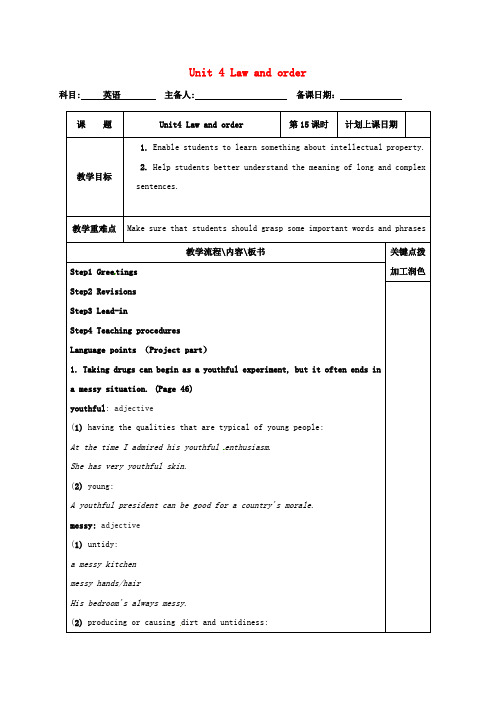
The medicine had little effect on the old man.
这种药那位老人几乎没用。
The WT O agreements will have an strong effect on our national industry.
I do every single bit of housework while he just does the dishes now and again.
(2) despite the fact that; although:
While I accept that he's not p erfect in many respects, I do actually quite like the man.
At the time I admired his youthful enthusiasm.
She has very youthful ful president can be good for a country's morale.
messy:adjective
2. Some people try them because they are curious. Others take drugs to rebel against their families or society. (Page 46)
rebel: verb[I]-ll-
(1)to fight against the government or to refuse to obey rules, etc:
While I fully understand your point of view, I do also have some sympathy with Michael's.
高中英语 Unit4 law and order-task精品教案 牛津译林版选修10
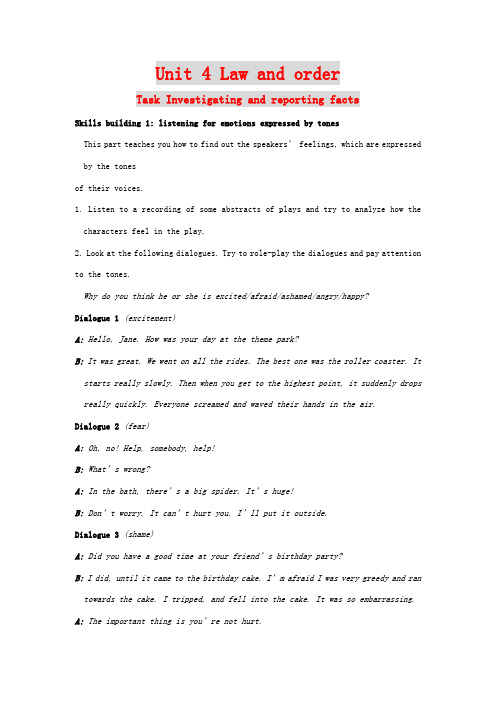
Unit 4 Law and orderTask Investigating and reporting factsSkills building 1: listening for emotions expressed by tonesThis part teaches you how to find out the speakers’ feelings, which are expressed by the tonesof their voices.1. Listen to a recording of some abstracts of plays and try to analyze how the characters feel in the play.2. Look at the following dialogues. Try to role-play the dialogues and pay attention to the tones.Why do you think he or she is excited/afraid/ashamed/angry/happy?Dialogue 1(excitement)A: Hello, Jane. How was your day at the theme park?B: It was great. We went on all the rides. The best one was the roller coaster. It starts really slowly. Then when you get to the highest point, it suddenly drops really quickly. Everyone screamed and waved their hands in the air. Dialogue 2 (fear)A: Oh, no! Help, somebody, help!B:What’s wrong?A:In the bath, there’s a big spider. It’s huge!B:Don’t worry. It can’t hurt you. I’ll put it outside.Dialogue 3(shame)A: Did you have a good time at your friend’s birthday party?B:I did, until it came to the birthday cake. I’m afraid I was very greedy and ran towards the cake. I tripped, and fell into the cake. It was so embarrassing. A:The important thing is you’re not hurt.Dialogue 4 (anger)A:What’s wrong? Your face is like thunder.B: I was on the bus home, and I think someone stole some money out of my pocket. It wasn’t much, but it made me so mad.A:Oh, no! At least the thief didn’t get very money though.Dialogue 5 (happiness)A: Congratulations on your exam results. You must be so pleased.B: I am. I worked really hard studying, and it all paid off.A:Let’s go out to dinner to celebrate.3. Read the instructions in this part. Make sure you know how each feeling can be expressed by different tones. Create a dialogue in which different emotions are expressed. Present your dialogues to the whole class and the rest students guess which feelings are being expressed.Step 1: finding out about a boy’s feelingsIn this part, you will first listen to a teacher interviewing a boy who has stolen some money at school, and then you will take some notes about the investigation. You will listen to the investigation again to decide the boy’s feelings from his tones.1. Read the guidelines in Part A to understand what you will do first. Go over the note sheet to get the ideas about what you should pay attention to and write them down while you are listening to the recording. Fill in the answers or predict the answers for some blanks before listening.2. Listen to the recording and finish Part A on page 58. You will have the chance to listen to the recording again and try to fill in the missing words correctly.Mr Li: You stole fifty yuan from the tin the monitor left on the desk after he collected the money for the school trip. Is that right?Xu Jin:(bad-tempered) How does he know it was me? It could have been anyone. Mr Li: (impatient) Now come on, you were the only person left in the room, alone with the money. Don’t play games with me. (threatening) If you don’t tell the truth, you could end up in trouble!Xu Jin: (afraid, voice shaking) I’m sorry, Mr Li. I didn’t mean that. Really, I was going to return the money later.Mr Li: (disbelieving) You were/ How did you think you were going to do that? The trip was the next day.Xu Jin:(embarrassed) I don’t know…Mr Li; (calm, fatherly) All right, now tell me why you wanted the money.Xu Jin:I wanted to go to the Internet café, and I didn’t have any money left. Mr Li:Have you been there before?Xu Jin: Yes. I go several times a week.Mr Li: What do you do there?Xu Jin:(mumbling a bit, not very convincing) I… do my ho mework.Mr Li:(disbelieving) Homework? Is that all?Xu Jin;Well, no. I play games.Mr Li;Games?Xu Jin:(eager) Yes. I play Internet games with people all around the world.It’s really fun, and I get to meet new friends from other countries.Mr Li:(disbelieving) Hmm. I am not so sure that’s a good thing. Do your parents know that you’re doing this?Xu Jin:No. I go late at night. They don’t know that I go out.Mr Li: (angry) Do you realize that you’ve allowed this habit of yours to make you do some very bad things? You’ve been lying to your parents and stole money3. Read the guidelines in Part B so that you will know what you will do here. First read the sentences that follow a nd then focus on the boy’s feelings while listening to the recordings again. Try to explain why you think the boy is angry/afraid/ashamed.4. Read Xu Jin’s letter of apology in Part C on page 59 and find out the details of the story.Answers:Skills building 2: asking and answering questions tactfullyIn this part you will know how to ask and answer questions tactfully so that you can usethe expressions presented in this part to find some information you need to know.1. Read the following two dialogues and judge in which dialogue the speakers are more polite when asking and answering questions and state your reasons. Dialogue 1A: Are you coming with me to the concert tonight?B:No. I’ve got my hands full with this report.Dialogue 2A: Excuse me, I would like to invite you to the concert. Could you please spare me some time tonight?B: I am terribly sorry. I am busy with this report and do not have any time to spare. The second conversation is formal using very polite language. The first one is more informal using colloquial langua ge and contractions, such as ‘I’ve got my hands full.’2. Read the guidelines and the expressions in this part. You will be given a situation in which you may use the expressions here. For example:Situation:Mr. Smith is explaining the meaning of the word ‘fall’ in American English, but Mike does not quite follow her.M:Excuse me, Mr. Smith, I didn’t quite follow you. Could you please explain the word ‘fall’ again?S: Well, let me explain it to you. It means ‘autumn’ in American English.Step 2: interviewing a parentIn this part, you will work in pairs to discuss the situation. You are expected to createthe conversation between Mr. Li and one of Xu Jin’s parents and discuss what can be done inthe future.1. You will be divided into groups of four and discuss the ways to solve the problem of the boy stealing.2. You are going to discuss the situation with the boy’s parent. Read the guidelines of this part and think about what information you can get from the table below. Work in pairs. One should act as Mr. Li and the other as Xu Jin’s parent. Role-play the dialogue and after you have finished your dialogue, you should switch roles. Present your dialogue to the whole class.Skills building 3: writing a reportHere you will read about how to write a report. You will learn that different kinds of reports may have certain points in common, and you are expected to know what a report should include.1. Think about your previous experience of reporting a scientific experiment. Answerthe following questions:Have you ever conducted an experiment?If you have, what did you do at the end of the experiment? (A report is often written and submitted at the end.)What was included in your report? (Most reports usually have an introduction, and then they detail the procedure of the experiment, and finally, there is the conclusion.)Read the guidelines of this part. There are many different kinds of reports and different ways to write them. However, they have certain points in common. Focus on the points listed that should be included in a report.2. Discuss in pairs the boy’s problem and think about how to write a report on theinvestigation.Step 3: writing a teacher’s reportIn this part, you will write a teacher’s report about Xu Jin’s problem based on theinformation you have collected in Steps 1 and 2. You are expected to practice the skillsyou have learnt in the previous Skills building.1. Read the guidelines of this part so that you can know that you will write a teacher’s report about Xu Jin’s problem with the information gathered in Steps1 and 2.2. Review the information in Steps 1 and 2 and look at the sheet below the guidelines for the main points you need to include in the report.3. Work in pairs to discuss what to write in the report. Write down you have discussed. You should complete the sheet based on your discussion and the notes you took. After finishing it, check spelling and grammar and then present your report to the whole class.。
高中英语 Unit4 law and order-task精品教案 牛津译林版选修10
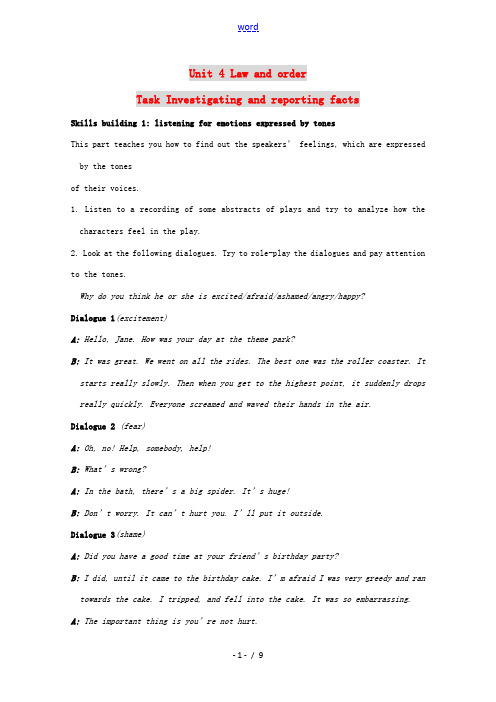
Unit 4 Law and orderTask Investigating and reporting factsSkills building 1: listening for emotions expressed by tonesThis part teaches you how to find out the speakers’ feelings, which are expressed by the tonesof their voices.1. Listen to a recording of some abstracts of plays and try to analyze how thecharacters feel in the play.2. Look at the following dialogues. Try to role-play the dialogues and pay attention to the tones.Why do you think he or she is excited/afraid/ashamed/angry/happy?Dialogue 1(excitement)A: Hello, Jane. How was your day at the theme park?B: It was great. We went on all the rides. The best one was the roller coaster. It starts really slowly. Then when you get to the highest point, it suddenly drops really quickly. Everyone screamed and waved their hands in the air.Dialogue 2 (fear)A: Oh, no! Help, somebody, help!B:What’s wrong?A:In the bath, there’s a big spider. It’s huge!B:Don’t worry. It can’t hurt you. I’ll put it outside.Dialogue 3(shame)A: Did you have a g ood time at your friend’s birthday party?B:I did, until it came to the birthday cake. I’m afraid I was very greedy and ran towards the cake. I tripped, and fell into the cake. It was so embarrassing. A:The important thing is you’re not hurt.Dialogue 4 (anger)A:What’s wrong? Your face is like thunder.B: I was on the bus home, and I think someone stole some money out of my pocket. It wasn’t much, but it made me so mad.A:Oh, no! At least the thief didn’t get very money though.Dialogue 5 (happiness)A: Congratulations on your exam results. You must be so pleased.B: I am. I worked really hard studying, and it all paid off.A:Let’s go out to dinner to celebrate.3. Read the instructions in this part. Make sure you know how each feeling can beexpressed by different tones. Create a dialogue in which different emotions are expressed. Present your dialogues to the whole class and the rest students guess which feelings are being expressed.Step 1: finding out about a boy’s feelingsIn this part, you will first listen to a teacher interviewing a boy who has stolen some money at school, and then you will take some notes about the investigation.You will listen to the investigation again to decide the boy’s feelings from his tones.1. Read the guidelines in Part A to understand what you will do first. Go over the note sheet to get the ideas about what you should pay attention to and write them down while you are listening to the recording. Fill in the answers or predict the answers for some blanks before listening.2. Listen to the recording and finish Part A on page 58. You will have the chance to listen to the recording again and try to fill in the missing words correctly.Mr Li: You stole fifty yuan from the tin the monitor left on the desk after he collected the money for the school trip. Is that right?Xu Jin:(bad-tempered) How does he know it was me? It could have been anyone. Mr Li: (impatient) Now e on, you were the only person left in the room, alone with the money. Don’t play games with me. (threatening) If you don’t tell the truth, you could end up in trouble!Xu Jin: (afraid, voice shaking) I’m sorry, Mr Li. I didn’t mean that. Really,I was going to return the money later.Mr Li: (disbelieving) You were/ How did you think you were going to do that? The trip was the next day.Xu Jin:(embarrassed) I don’t know…Mr Li; (calm, fatherly) All right, now tell me why you wanted the money.Xu Jin:I wanted to go to the Internet café, and I didn’t have any money left. Mr Li:Have you been there before?Xu Jin: Yes. I go several times a week.Mr Li: What do you do there?Xu Jin:(mumbling a bit, not very convincing) I… do my homework.Mr Li:(disbelieving) Homework? Is that all?Xu Jin;Well, no. I play games.Mr Li;Games?Xu Jin:(eager) Yes. I play Internet games with people all around the world. It’s really fun, and I get to meet new friends from other countries.Mr Li: (di sbelieving) Hmm. I am not so sure that’s a good thing. Do your parents know that you’re doing this?Xu Jin:No. I go late at night. They don’t know that I go out.Mr Li: (angry) Do you realize that you’ve allowed this habit of yours to make you do some ve ry bad things? You’ve been lying to your parents and stole money3. Read the guidelines in Part B so that you will know what you will do here. Firstread the sentences that follow and then focu s on the boy’s feelings while listening to the recordings again. Try to explain why you think the boy is angry/afraid/ashamed.4. Read Xu Jin’s letter of apology in Part C on page 59 and find out the detailsof the story.Answers:Skills building 2: asking and answering questions tactfullyIn this part you will know how to ask and answer questions tactfully so that you can usethe expressions presented in this part to find some information you need to know.1. Read the following two dialogues and judge in which dialogue the speakers are morepolite when asking and answering questions and state your reasons.Dialogue 1A: Are you ing with me to the concert tonight?B:No. I’ve got my hands full with this report.Dialogue 2A: Excuse me, I would like to invite you to the concert. Could you please spare me some time tonight?B: I am terribly sorry. I am busy with this report and do not have any time to spare. The second conversation is formal using very polite language. The first one is more informal using colloquial language and contract ions, such as ‘I’ve got my hands full.’2. Read the guidelines and the expressions in this part. You will be given a situation in which you may use the expressions here. For example:Situation:Mr. Smith is explaining the meaning of the word ‘fall’ in Amer ican English, but Mike does not quite follow her.M:Excuse me, Mr. Smith, I didn’t quite follow you. Could you please explain the word ‘fall’ again?S: Well, let me explain it to you. It means ‘autumn’ in American English.Step 2: interviewing a parentIn this part, you will work in pairs to discuss the situation. You are expected to createthe conversation between Mr. Li and one of Xu Jin’s parents and discuss what can be done inthe future.1. You will be divided into groups of four and discuss the ways to solve the problemof the boy stealing.2. You are going to discuss the situation with the boy’s parent. Read the guidelinesof this part and think about what information you can get from the table below.Work in pairs. One should act as Mr. Li and t he other as Xu Jin’s parent. Role-play the dialogue and after you have finished your dialogue, you should switch roles.Present your dialogue to the whole class.Skills building 3: writing a reportHere you will read about how to write a report. You will learn that different kinds of reports may have certain points in mon, and you are expected to know what a report should include.1. Think about your previous experience of reporting a scientific experiment. Answerthe following questions:Have you ever conducted an experiment?If you have, what did you do at the end of the experiment?(A report is often written and submitted at the end.)What was included in your report? (Most reports usually have an introduction, and then they detail the procedure of the experiment, and finally, there is theconclusion.)Read the guidelines of this part. There are many different kinds of reports and different ways to write them. However, they have certain points in mon. Focus on the points listed that should be included in a report.2. Discuss in pairs the boy’s problem and think about how to write a report on theinvestigation.Step 3: writing a teacher’s reportI n this part, you will write a teacher’s report about Xu Jin’s problem based ontheinformation you have collected in Steps 1 and 2. You are expected to practice the skillsyou have learnt in the previous Skills building.1. Read the guidelines of this pa rt so that you can know that you will write a teacher’sreport about Xu Jin’s problem with the information gathered in Steps 1 and 2.2. Review the information in Steps 1 and 2 and look at the sheet below the guidelinesfor the main points you need to include in the report.3. Work in pairs to discuss what to write in the report. Write down you have discussed.You should plete the sheet based on your discussion and the notes you took. After finishing it, check spelling and grammar and then present your report to the whole class.。
高中英语 Unit4 law and orderreading精品教案 牛津译林版选修10
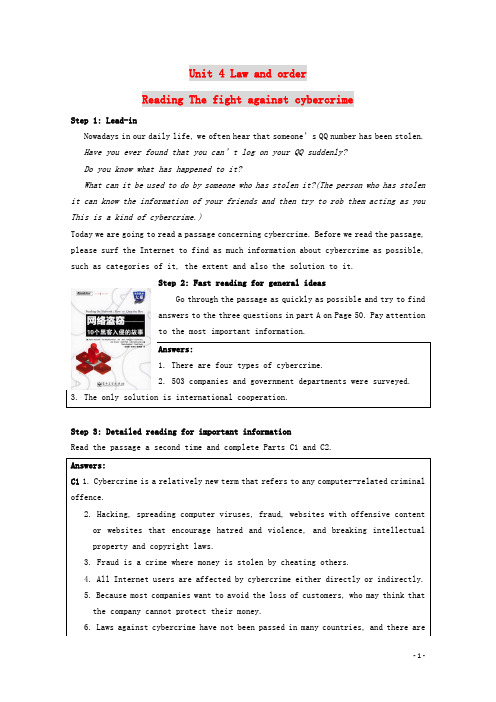
Unit 4 Law and orderReading The fight against cybercrimeStep 1: Lead-inNowadays in our daily life, we often hear that someone’s QQ number has been stolen.Have you ever found that you can’t log on your QQ suddenly?Do you know what has happened to it?What can it be used to do by someone who has stolen it?(The person who has stolen it can know the information of your friends and then try to rob them acting as you This is a kind of cybercrime.)Today we are going to read a passage concerning cybercrime. Before we read the passage, please surf the Internet to find as much information about cybercrime as possible, such as categories of it, the extent and also the solution to it.Step 2: Fast reading for general ideasGo through the passage as quickly as possible and try to find answers to the three questions in part A on Page 50. Pay attentionto the most important information.Answers:1. There are four types of cybercrime.2. 503 companies and government departments were surveyed.3. The only solution is international cooperation.Step 3: Detailed reading for important informationRead the passage a second time and complete Parts C1 and C2.Answers:C1 1.Cybercrime is a relatively new term that refers to any computer-related criminal offence.2. Hacking, spreading computer viruses, fraud, websites with offensive contentor websites that encourage hatred and violence, and breaking intellectual property and copyright laws.3. Fraud is a crime where money is stolen by cheating others.4. All Internet users are affected by cybercrime either directly or indirectly.5. Because most companies want to avoid the loss of customers, who may think thatthe company cannot protect their money.6. Laws against cybercrime have not been passed in many countries, and there areStep 4:Practice:plete Part D. You may refer to the reading passage on pages 50 and 51 for somehelp.2. Complete Part E.E (1) cybercrime (2) tight (3) computers (4) security (5) viruses(6) hacked (7) content (8) violence (9) offence (10) privateStep 5: Post-reading activities1. First role-play the dialogue in Part F and then forms groups of four to discussthe three questions that follow.2. You will be divided into groups of four. Each group chooses to report one aspectfromthe following items: the definition and different types of cybercrime; the extent of theproblem; the legal situation regarding cybercrime and the solution to the problem. Step 5: Language points:Step6:Homework1. Read the text again and again. Try to memorize the language points.2. Parts A1 and A2 on page122 in Workbook.。
江苏省启东中学高中英语 Unit 4 Law and order Grammar Language styles教案 牛津译林版选修10
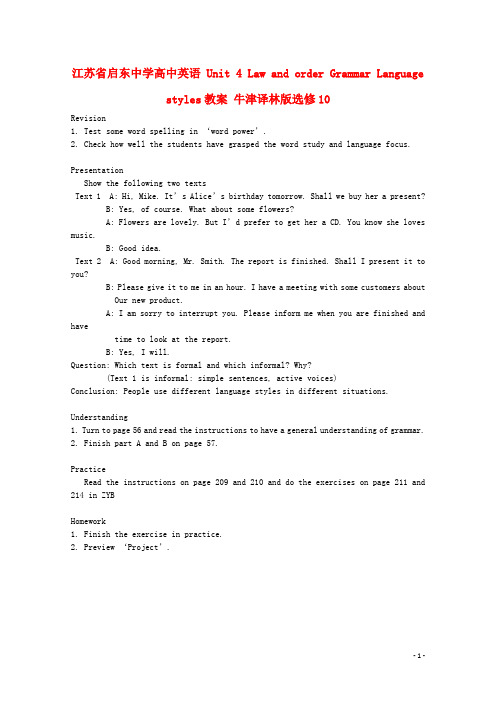
江苏省启东中学高中英语 Unit 4 Law and order Grammar Languagestyles教案牛津译林版选修10Revision1. Test some word spelling in ‘word power’.2. Check how well the students have grasped the word study and language focus.PresentationShow the following two textsText 1 A: Hi, Mike. It’s Alice’s birthday tomorrow. Shall we buy her a present? B: Yes, of course. What about some flowers?A: Flowers are lovely. But I’d prefer to get her a CD. You know she loves music.B: Good idea.Text 2 A: Good morning, Mr. Smith. The report is finished. Shall I present it to you?B: Please give it to me in an hour. I have a meeting with some customers about Our new product.A: I am sorry to interrupt you. Please inform me when you are finished and havetime to look at the report.B: Yes, I will.Question: Which text is formal and which informal? Why?(Text 1 is informal: simple sentences, active voices)Conclusion: People use different language styles in different situations.Understanding1. Turn to page 56 and read the instructions to have a general understanding of grammar.2. Finish part A and B on page 57.PracticeRead the instructions on page 209 and 210 and do the exercises on page 211 and 214 in ZYBHomework1. Finish the exercise in practice.2. Preview ‘Project’.- 1 -。
高中英语Unit4Lawandorder教案10牛津译林版选修10201704266115.doc
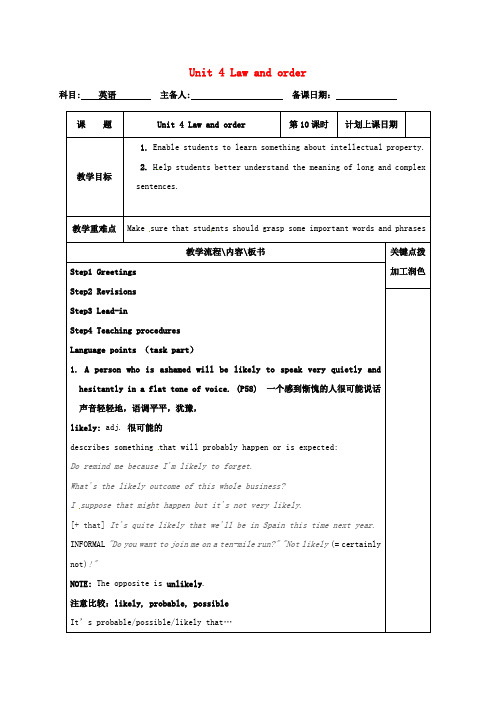
Unit 4 Law and order科目: 英语主备人: 备课日期:elp students better understand the meaning of long and complex Make sure that students should grasp some important words and phrasesthat will probably happen or is expected:suppose that might happen but it's not very likely.2. I am writing to apologize for my recent behaviour. (P59)Trains may be subject to delay on the northernShe apologized for having to leave at 3.30 p.m.She complained to the company about its awful service and they sent her used to to som ething:nt of her house waitinback并没有仔细地考虑这件事We should be able to pay off the debt within two years.精美句子1、善思则能“从无字句处读书”。
读沙漠,读出了它坦荡豪放的胸怀;读太阳,读出了它普照万物的无私;读春雨,读出了它润物无声的柔情。
读大海,读出了它气势磅礴的豪情。
读石灰,读出了它粉身碎骨不变色的清白。
2、幸福幸福是“临行密密缝,意恐迟迟归”的牵挂;幸福是“春种一粒粟,秋收千颗子”的收获. 幸福是“采菊东篱下,悠然见南山”的闲适;幸福是“奇闻共欣赏,疑义相与析”的愉悦。
幸福是“随风潜入夜,润物细无声”的奉献;幸福是“夜来风雨声,花落知多少”的恬淡。
高中英语 Unit4 law and orderwelcome精品教案 牛津译
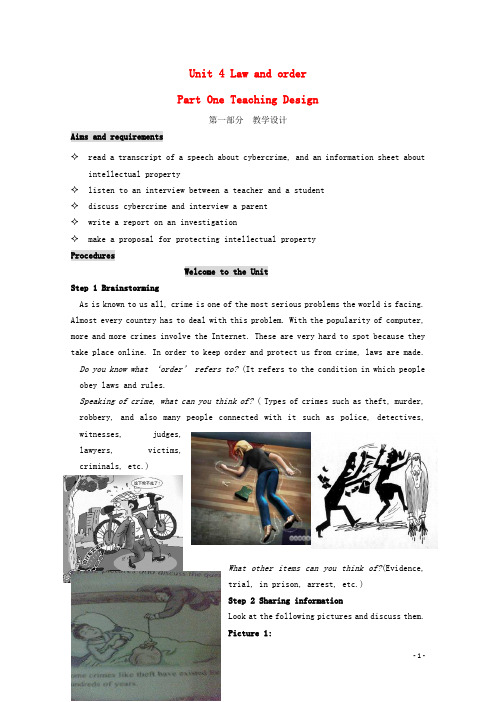
Unit 4 Law and orderPart One Teaching Design第一部分教学设计Aims and requirements✧read a transcript of a speech about cybercrime, and an information sheet aboutintellectual property✧listen to an interview between a teacher and a student✧discuss cybercrime and interview a parent✧write a report on an investigation✧make a proposal for protecting intellectual propertyProceduresWelcome to the UnitStep 1 BrainstormingAs is known to us all, crime is one of the most serious problems the world is facing. Almost every country has to deal with this problem. With the popularity of computer, more and more crimes involve the Internet. These are very hard to spot because they take place online. In order to keep order and protect us from crime, laws are made. Do you know what ‘order’ refers to? (It refers to the condition in which people obey laws and rules.Speaking of crime, what can you think of? ( Types of crimes such as theft, murder, robbery, and also many people connected with it such as police, detectives, witnesses, judges,lawyers, victims,criminals, etc.)What other items can you think of?(Evidence,trial, in prison, arrest, etc.)Step 2 Sharing informationLook at the following pictures and discuss them.Picture 1:What is the man trying to do with the hook? (He is trying to steal the bag while the other person is sleeping.)How long ago did this happen? How do you know? (Judging from their appearance, it might have happened hundreds of years ago.)Do you think this often happen nowadays?(This particular type of theft is less likely than in ancient times, although people still steal nowadays.)Picture 2Have you ever heard about cybercrime? What doyou know about it?➢Cybercrime has developed very recently.➢It involves the Internet, and it is hard todetect or track..➢It is not easy to catch the criminalsinvolved in cybercrime because they couldbe in any country and can move quickly from place to place.➢It uses computer technology, and most criminals involved in it are experts in IT.➢International cooperation is needed to fight against it.Picture 3Do you know anything about what the police do forsociety? (The police help to keep order and guard oursociety. They catch thieves, direct traffic andprotect people.)What is your opinion about their work? Do you thinkour society would be safe without them? (They play animportant role in protecting our society from crimeand disorder. Without them, our society would be lawless.)Do you want to be a policeman or policewoman? Why or why notPicture 4Some people copy artist’s music or lyrics withouttelling or paying them. They do this for eitherpersonal or commercial use. This is called‘piracy’. What is your opinion about it?Have you ever seen pirate books, CDs or DVDs forsales?Do you think it is OK to pirate them?(No, it is illegal to copy them without permission. Other people’s works are their intellectual property, which should be protected by law. Otherwise, creators would be harmed, and they would stop creating new works.) Step 3: Discussion:1. Why do you think people break the law?What do you think of people who break the law? (People break the law for various reasons. Some do so to express hatred, or in the hope of getting more money or power. Some people are professional criminals.They do not know any other way of making money. Many simply have no sense of law, so when they break a law, they even do not know this. People who break the law are sometimes worth our sympathy or care but more often than not they can’t be forgiven and should be seriously punished.)2. As a student, what do you think you can do to make our society safer?(First, weourselves should know about the law and keep the law. Second, we should educate other people to obey the law and try our best to fight against bad acts in our society and even stop crimes when necessary.)3. Have you ever happened to see or experience any crimes? What did you do then? Step 4: Homework:1.Collect more information about cybercrime.2.Prepare the Reading part.。
高中英语 Unit4 law and order-word power精品教案 牛津译林版选修10

Unit 4 Law and orderWord powerStep 1: Brainstorming1. Surf the Internet or refer to some relevant resources such as newspapers, magazinesor books about the role of the police and the stages of the legal process.In this section, you will learn some expressions related to the law. Please try to find out about:the people involved in the legal system and what they dothe stages of the legal process and what different people do in this process 1.Present the information you have collected about the law to the whole class. Step 2: Vocabulary learning1. Read the article in Part A on page 54. Explain the following words in your own words.a witness: a person who sees a crime happena criminal: a person who commits a crimea detective: a member of the police who tries to find out the person responsiblefor committing a crimea victim: a person who is injured or most directly affected by the crime2. Read the flow chart about the legal process in Part B.3. Read the passage in Part C on page 55 and fill in the missing words.Step 3: Vocabulary extension1. Can you tell me any English words for types of crime? (These words include burglary, armed robbery, theft, assault, shoplifting, mugging, murder, drug dealing and smuggling, etc.)2. Do Part D in pairs. You can consult your dictionary.Step 4: Homework:Complete the related exercises in Workbook..。
高中英语Unit4Lawandorder教案5牛津译林版选修10201704266129.doc

Unit 4 Law and order科目: 英语主备人: 备课日期:课日期ng about intellectual property.Step2 Revisi onssome point in the far-of f futuredescribes a place that is a g reat distance awayleNews of the pay cuts had somehow leaked out.(Water and other liquids can stained unprotected wood surfaces.adjective the same in a lot of places or for a lot of people: phrasal verb to form the total of something: something from happening or nUnnecessary paperwork should be avoided at all costs.精美句子1、善思则能“从无字句处读书”。
读沙漠,读出了它坦荡豪放的胸怀;读太阳,读出了它普照万物的无私;读春雨,读出了它润物无声的柔情。
读大海,读出了它气势磅礴的豪情。
读石灰,读出了它粉身碎骨不变色的清白。
2、幸福幸福是“临行密密缝,意恐迟迟归”的牵挂;幸福是“春种一粒粟,秋收千颗子”的收获. 幸福是“采菊东篱下,悠然见南山”的闲适;幸福是“奇闻共欣赏,疑义相与析”的愉悦。
幸福是“随风潜入夜,润物细无声”的奉献;幸福是“夜来风雨声,花落知多少”的恬淡。
幸福是“零落成泥碾作尘,只有香如故”的圣洁。
幸福是“壮志饥餐胡虏肉,笑谈渴饮匈奴血”的豪壮。
幸福是“先天下之忧而忧,后天下之乐而乐”的胸怀。
幸福是“人生自古谁无死,留取丹心照汗青”的气节。
3、大自然的语言丰富多彩:从秋叶的飘零中,我们读出了季节的变换;从归雁的行列中,我读出了集体的力量;从冰雪的消融中,我们读出了春天的脚步;从穿石的滴水中,我们读出了坚持的可贵;从蜂蜜的浓香中,我们读出了勤劳的甜美。
高中英语 Unit4 Law and order Welcome to the unit教案 牛津译
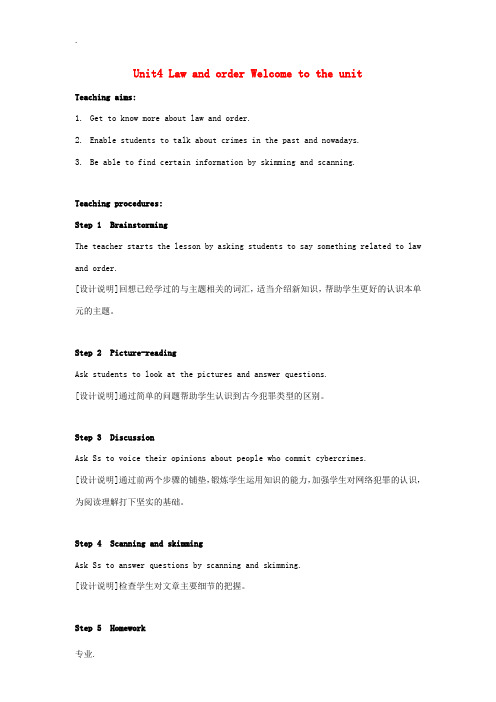
Unit4 Law and order Welcome to the unitTeaching aims:1.Get to know more about law and order.2.Enable students to talk about crimes in the past and nowadays.3.Be able to find certain information by skimming and scanning.Teaching procedures:Step 1 BrainstormingThe teacher starts the lesson by asking students to say something related to law and order.[设计说明]回想已经学过的与主题相关的词汇,适当介绍新知识,帮助学生更好的认识本单元的主题。
Step 2 Picture-readingAsk students to look at the pictures and answer questions.[设计说明]通过简单的问题帮助学生认识到古今犯罪类型的区别。
Step 3 DiscussionAsk Ss to voice their opinions about people who commit cybercrimes.[设计说明]通过前两个步骤的铺垫,锻炼学生运用知识的能力,加强学生对网络犯罪的认识,为阅读理解打下坚实的基础。
Step 4 Scanning and skimmingAsk Ss to answer questions by scanning and skimming.[设计说明]检查学生对文章主要细节的把握。
Step 5 HomeworkAsk Ss to surf the Internet and write a short passage on cybercrime.[设计说明]通过家庭作业再次巩固所学内容。
高中英语 Unit 4 Law and order教案12 牛津译林版选修10-牛津版高三选修10英

▲Ideas are more (5)_______than material things.
Part 3
The___(6)_____in protecting intellectual property
We should not buy pirated productsor_(10)____ music and films illegally.
Step2.Translate the following phrases.
1定义为2被分两类
3适用于4值得他人为此付费
5被欢迎加入该组织6面对
7免费下载8仅2005年一年
Unit 4 Law and order
科目:英语主备人: 备课日期:
课 题
Unit4 Law and order
第12课时
计划上课日期
教学目标
1.Enable students to learn something about intellectual property.
2.Help students better understand the meaning of long and plex sentences.
▲Many countries had not passed laws to protect intellectual property until recently.
▲Some panies have made money by producing fake or (7)________ goods.
高中英语 Unit 4 Law and order教案6 牛津译林版0牛津版高三0英语教案
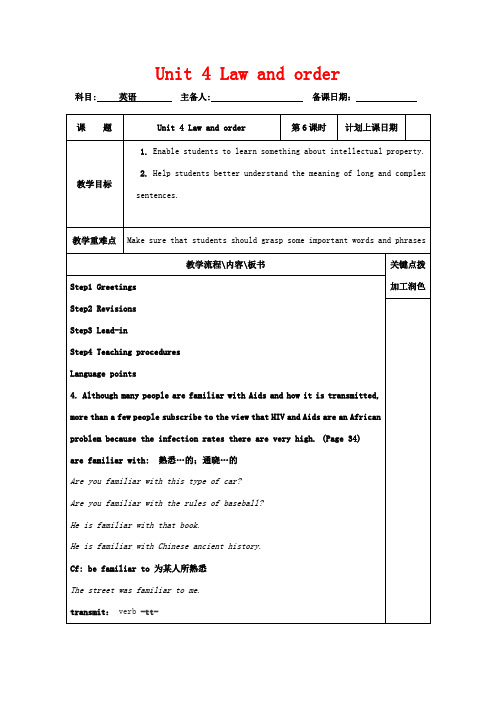
4. Although many people are familiar with Aids and how it is transmitted, more than a few people subscribe to the view that HIV and Aids are an African problem because the infection rates there are very high. (Page34)
除了很少的几句外,我对法语一无所知。
作业
布置
教学
心得
(4) more than…can /could, 意思是“不能…”,表示否定意义。
The cold was more than people could bear.
高考链接:
--Do you need any help,Lucy?
--Yes. The job is _____ I could do myself. (福建2007)
are familiar with: 熟悉…的;通晓…的
Are you familiar with this type of car?
Are you familiar with the rules of baseball?
He is familiar with that book.
He is familiar with Chinese ancient history.
Cf: be familiar to 为某人所熟悉
The street was familiartome.
transmit:verb-tt-
(1)to pass something from one person or place to another:a sexually transmitted diseaseCholera is transmittedthroughcontaminated water.Some diseases are transmittedfromone generationtothe next.[R]Somehow your panic and fear transmits itselftothe horse that you're riding.
- 1、下载文档前请自行甄别文档内容的完整性,平台不提供额外的编辑、内容补充、找答案等附加服务。
- 2、"仅部分预览"的文档,不可在线预览部分如存在完整性等问题,可反馈申请退款(可完整预览的文档不适用该条件!)。
- 3、如文档侵犯您的权益,请联系客服反馈,我们会尽快为您处理(人工客服工作时间:9:00-18:30)。
Unit4 Law and order Language pointsTeaching aims:具体陈述本课时要做的事及其目的,要从学生学习的角度陈述,如:1.Find and list some key words and phrases.2.Learn to use those core words or phrases properly.3.Remember some useful phrases.Teaching procedures:Step 1 IntroductionThe teacher starts the lesson with a short introduction of the lesson.【设计说明】教师简单介绍本堂课的主要目的与要求。
Step 2 Reading and collectingGo through the passage paragraph by paragraph, focusing on the core words, phrases and useful sentences.【设计说明】通过对文章逐段的梳理,理出核心的词汇、短语和句型,并加以拓展、强化训练。
进一步巩固学生的语言知识。
Step 3 Language points1. …as the Internet has expanded in recent years, the opportunities for crime have expanded as well. (p.50 line 1)expand v. —to become larger in size, number, or amount, or to make something become larger 展开,张开;扩大,扩充e.g. The population of the town expanded rapidly in the 1960.20 世纪 60 年代, 这个镇子的人口迅速增加。
Water expands as it freezes. 水结冰时会膨胀。
联想:extend extent2. Committing crime online is no longer a theoretical possibility. (p.50, lines 2-4)commit v. — to do something wrong or unlawful 犯罪e.g. He has committed a serious fault 他犯了一个严重的错误。
3. Cybercrime refers to any criminal offence related to the Internet. (p.50 line7) offence n.— an illegal action or a crime; behavior which offends someone犯罪,罪行e.g.Driving while drunk is a serious offence.醉酒驾车属严重违例。
The problem was how to get rid of her without causing offence.问题是怎样摆脱她而又不得罪她。
4. Third, the Council mentions websites which contain offensive information or encourage hatred and violence. (p.50 line 13-14)offensive adj.冒犯的,极其讨厌的;攻击性的e.g. The advertisements were highly offensive to woman.这些广告令女士们大为反感。
hatred n.仇恨由动词 hate 变化而来e.g.He looked at me with hatred in his eyes.他用憎恨的眼光望着我。
have a hatred for/of 憎恶…….e.g. She has a profound hatred of fascism.她对法西斯主义怀有深仇大恨。
5. …as it helps us assess the problem of cybercrime. (p.50 line17-18)assess vt. 评估;估算assess sb./sth. (as sth.) 评估,评定(性质、质量)e.g. I assess your chance as low. 我估计你的机会不大。
assess sth. (at sth.) 估算、估定(数量、价值)e.g. They have assessed the amount of compensation to be paid.他们已经核定赔偿额。
Damage to the building was assessed at $40000.该建筑物的损失估定为4万美元。
6. Security consultants tell us that cybercrime is costing firms worldwide hundreds of billions of dollars every year. (p.50, line 30)firm n.公司;商行;商号e.g. He has just started an engineering firm. 他刚开了一家工程公司。
近义词:company, corporationfirm adj. 坚硬的;牢固的;坚定的e.g. We have no firm evidence to support the case.我们没有确凿的证据支持这个论点。
We must maintain a firm attitude.我们必须采取坚定的态度。
7. …and the companies must pay the thieves money to keep them from leaking the contents. (p.51 line34)leak vt. vi.泄露;渗漏e.g. The roof was leaking. 屋顶在漏雨。
leak sth. (to sb.)e.g. The contents of the report were leaked to the press.报告的内容泄露到新闻界了。
leak n.漏洞,裂缝;泄露e.g. You must shut the gas supply off if there is a leak.煤气泄漏时,必须把阀门关上。
8. …the company cannot protect their confidential information or their money. (p.51 line39)confidential adj.机密的,保密的;秘密的e.g. Your medical records are strictly confidential. 你的病历是绝对保密的。
confident adj. 自信的,确信的e.g. Your encouragement made me more confident of my future.你的鼓励使我对我的未来更有信心。
confidence n.信任,信心e.g. She has great confidence in her success.她对自己的成功非常有信心。
confidentially adv. 秘密地,悄悄地,私下的e.g. She told me confidentially that she is going to retire early.她私下告诉我她要提前退休。
9. …most countries do not have arrangements for dealing with suspe cts from other countries who may have committed cybercrime. (p.51 line45)suspect n.嫌疑犯,可疑对象e.g. He is a prime suspect in this murder case.他是这起谋杀案的主要嫌疑人。
suspect vt. 怀疑(某人有罪);怀疑(某事属实或可能发生,尤指坏事)suspect sb. (of sth./of doing sth.)怀疑(某人有罪)e.g. He resigned after being suspected of theft.他被怀疑有偷窃行为,随后就辞职了。
The drug is suspected of causing over 200 deaths.这种药被怀疑可以导致超过200人死亡。
suspect adj. 可疑的,不可信的e.g. Some of the evidence they produced was highly suspect.一些他们提供的证据非常可疑。
10. The only answer to this problem is international cooperation. (p.51 line49) cooperation n.合作1) cooperation (with sb.) (in doing sth.)cooperation (between A and B)e.g. We would like to see closer cooperation between parents and schools.我们希望学生家长和学校有更加紧密的合作。
cooperate v. 合作,协作cooperate with sb. in/on sth.e.g. The two groups agreed to cooperate with each other.这两个组同意相互协作。
Step 4 HomeworkTry to make up a story by using the words and phrases we’ve learned in this passage.。
